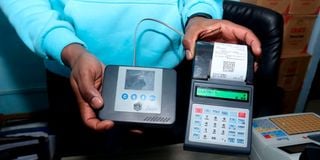Supermarkets, petrol stations in dilemma over KRA invoice rule

A new model of Electronic tax register machine for automatic transmission of tax data by businesses.
High-traffic businesses such as petrol stations and supermarkets face a dilemma in compliance with a directive by the Kenya Revenue Authority (KRA) that detailed buyer information be included in sales receipts.
In a significant shift, the Finance Act, of 2023 empowered KRA to establish an electronic system for issuing electronic tax invoices and keeping records of stock effective 1 September 2023.
A review of the KRA online and virtual sales control unit shows that traders will be required to give detailed information including their business name, physical addresses, and personal identification numbers(PINs) as well as those of the corresponding buyers, the item description, unit price, quantity, total price, and tax designation before any sales transactions would be approved.
Analysts however warned that the new rule on electronic tax invoices posed a compliance challenge for businesses with high buyer traffic.
“Due to the nature of certain retailers such as supermarkets or petrol stations, some of the information to be included in the electronic invoice such as buyer’s details may be impractical due to the large volume of transactions. Further, a large number of customers are on a walk-in/walk-out basis” Alex Mathini, Andrew Oduor, Patience Mbugua, and Kelvin Mbithi, partners at law firm, Bowmans said in an analysis.
“It is unclear what KRA will consider sufficient buyer’s identifying information which may lead to disputes over documentation. The above-mentioned businesses will have to discuss with KRA to have their system specifically configured in relation to the buyer’s information collected” they added.
The issuance of a buyer’s PIN is however optional on KRA Online & Virtual Sales Control Unit (OSCU & VSCU) -- is a software module that links the Trader Invoicing System (TIS) to KRA for processing of sales receipts.
The KRA system further demands that sales invoices detail the discount percentage offered, the total price of an item with a discount as well as the negative value of the total discounts given as part of a strategy to seal leaks.
A sales invoice will also display the total amount computed before the discount, the total tax-exempted amount, the total amount without tax, the total amount of TAX to be paid and the total price to be paid. Further, the invoice will contain the payment method, and the number of items sold and contain a tabular presentation of the various tax components including goods exempted from value-added-tax(VAT), those charged 16 percent VAT, zero-rated goods, non-vatable goods and those charged eight percent VAT.
The invoices will also list the date and time of the transaction, the serial number of the OSCU/VSCU equipment, and a unique signature receipt.
“Trader Invoicing System shall not be able to print receipts of any type before the aforementioned data flow has been finalized. This means that it shall be impossible to issue a receipt if the TIS did not receive any response from the OSCU or VSCU” KRA said.
Traders will now be required to seek the taxman’s nod to perform any other business the next day under the new system, meaning incorrect or incomplete data logged the previous day could lock them out.
Failure to comply with the regulations attracts a fine not exceeding Sh1 million, imprisonment for a term not exceeding three years, or both.
The new ETRs also have a control unit serial number issued by KRA to identify each tax register beside a control unit invoice number which is a unique number generated by the tax register upon issuance of each tax invoice.
The gadgets also come with a Quick Response (QR) code which helps one to confirm the validity of the tax invoice.
To beat tax cheats, the authority now requires that electronic tax registers (ETRs) be connected to its systems for monitoring daily sales.
The law requires all businesses with an annual turnover of at least Sh5 million to have ETRs. The Internet-enabled ETRs come with several unique features. For example, it captures the personal identification number (PIN) of the gadget’s buyer.




